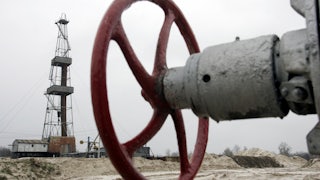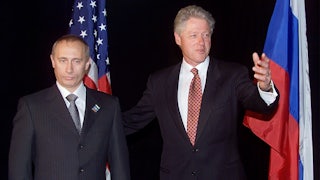On Thursday, Sarah Bloom Raskin will go before the Senate Banking Committee for her confirmation hearing to become the vice chair for supervision of the Federal Reserve Board of Governors. A former member of the board and former deputy treasury secretary, she is well credentialed for the job. Controversially, she also thinks the trillions of dollars’ worth of climate destruction likely to face the United States this century is something the world’s most powerful bank should consider in its decisions. Her confirmation hearing could serve as a useful temperature check on how Republicans plan to spin their protection of corporate profits over the reality of the climate crisis.
The position of vice chair for supervision is still somewhat loosely defined. It was created by the Dodd-Frank bill in 2010, in the aftermath of the Great Recession, as a corrective to lax regulation over the banking sector. Per that bill, Raskin would be charged with the “supervision and regulation of depository institution holding companies and other financial firms supervised by the Board”—namely banks. Claudia Sahm, a former Federal Reserve economist and now director of macroeconomic research for the Jain Family Institute, argues that the post is “the most consequential of the Biden nominees” and is likely to “shape the path of regulatory, financial stability, and payments policy at the Fed for decades to come.” The fact that Raskin seems to agree with the general premise of regulating banks and wants to take into account the profound changes the climate crisis will bring about has predictably set off alarm bells for the financial and fossil fuel sectors and the politicians they bankroll.
So what do they have to be afraid of? In The New York Times, Bloom Raskin has criticized no-strings-attached Federal Reserve funds being used to prop up risky, overleveraged fossil fuel companies as part of pandemic bond-buying programs. “The Fed,” she wrote, “is ignoring clear warning signs about the economic repercussions of the impending climate crisis by taking action that will lead to increases in greenhouse gas emissions at a time when even in the short term, fossil fuels are a terrible investment.” In testimony before the House Select Committee on the Climate Crisis, she said, “Informed decisions allow us to mitigate the financial impact of climate risks and fashion timely remedies ahead of a crisis,” noting the need for financial regulators to “foster the development of climate-related financial risk management technology,” including climate-related financial disclosures and stress tests, like those endorsed by both Jay Powell and the European Central Bank.
Tom Quaadman, executive vice president of the U.S. Chamber of Commerce’s Center for Capital Markets Competitiveness, sent an open letter to Senate Banking Committee Chair Sherrod Brown, the Ohio Democrat, and Republican ranking member Pat Toomey, consisting of a list of questions the chamber would like posed in the hearing. “Can bank mergers,” Quaadman asked, “benefit competition and consumers, and if so, how? Are there any examples of past bank mergers that promoted competition?” He also questioned whether Raskin is committed to “activities-based regulation,” which exempts gargantuan asset managers from being subject to the same rules as banks. BlackRock lobbied aggressively for this regulatory approach during the Obama administration, so as to avoid being designated a systemically important financial institution under Dodd-Frank’s purview.
In a section specifically about oil and gas, Quaadman also urges senators to ask Raskin whether it is the Fed’s role “to direct capital away from certain industries that are politically disfavored or direct capital towards industries that are politically favored.” The not-so-subtle suggestion is that Raskin might be politically motivated to crack down on the fossil fuel industry. Forty-one oil and gas industry trade groups have spoken out against her nomination, writing in a letter to the committee that her “favored policies would wreak havoc with the economy.” Toomey also voiced “serious concerns” about her nomination, warning she might join “the Left” to “misuse financial regulation to politicize capital allocation and advance a far-left agenda” and “pressure banks to choke off credit to traditional energy companies.”
The language mirrors the “Energy Discrimination Elimination” bills backed by the American Legislative Exchange Council, or ALEC, spreading out across state legislatures around the country, demanding pension funds divest from financial institutions that “boycott energy companies.” Fittingly, a coalition including many of the Republican state officials who are backing just such “anti-ESG” (environmental, social and governance) efforts has weighed in on Raskin’s nomination, too. A letter to the Banking Committee from 24 state treasurers, auditors, and financial officers is less muted than the Chamber’s entry, arguing against Raskin’s bid outright. “We oppose Ms. Raskin’s radical banking and economic views and are deeply concerned that she would use the supervisory authority as Vice-Chair for Supervision at the Federal Reserve Bank to disrupt the private banking sector, reliable energy supplies, and the U.S. economy,” the group writes.
The drive behind their anti-ESG measures is to safeguard the fossil fuel industry against any and all threats, even when they happen to be terrible investments. Financial institutions either divesting from or simply choosing not to invest in carbon-intensive companies and projects, the thinking goes, constitutes a form of discrimination.
This could all make for a contentious hearing, as mainly Republican senators attempt to paint their extractive-sector campaign donors—now raking in massive profits and engaging in tens of billions of dollars in stock buybacks—as the victims of woke ESG social justice warriors trying to cancel them with vaguely worded net-zero pledges. Those social justice warriors include everyone from veteran Fed officials like Raskin to BlackRock CEO Larry Fink, whom some Republicans now dislike for having embraced ESG rhetoric.*
The Fed is tasked with ensuring the stability of the financial system as well as full employment, and its policies ripple well beyond U.S. borders, due to the dollar’s status as the world’s reserve currency. Given the estimated $343 billion that climate disasters cost last year, and the 1.1 degrees Celsius of warming of the planet, financial regulators can either consider the threat posed by climate change and the fossil fuel industry’s stranded assets or ignore them and see what happens—as several senators are likely to argue on Thursday. The main threat the right has identified, then, is that Sarah Bloom Raskin might actually do her job.
* This article originally misstated that Joe Manchin holds a seat on the Senate Banking Committee.






